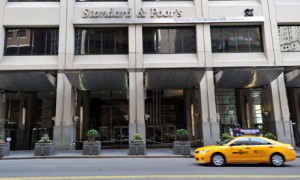London – Standards & Poor’s (S&P) a leading global rating agency, has raised concerns that Nigeria’s crude oil production forecast of 2.39 million barrels a day in the 2014 budget, was over-estimated.
This, according to the rating agency, was due to increased tension in the Niger Delta region and the forthcoming 2015 general elections.
Ravi Bhatia, an analyst at S&P, said: “It’s a concern if they have a big rise in pre-election expenditure and there’s a big revision on the oil price or there is a production shortfall due to Niger Delta tensions. High global oil prices are helping to sustain the picture as it stands now.”
Bhatia described as optimistic, the 2.39 million barrels a day projection put forward by the Presidency to the National Assembly.
According to him, a $10 to $15 fall in the global oil price might change the fiscal equation for Nigeria, adding that ” the country is very sensitive to oil prices.”
He said Nigeria would not achieve a substantial increase in production until it passed the long-delayed Petroleum Industry Bill.
Bhatia noted that Nigeria’s Excess Crude Account had been drawn down quite significantly, adding though that it was still enough to provide a slight buffer.
Bloomberg had in its survey a couple of days ago stated that Nigerian oil production averaged less than two million barrels a day last year, compared with the 2.53 million barrels the government had predicted.
It stated West Texas Intermediate crude for February delivery was currently trading at about $93 a barrel, compared with an oil price of $77.5 a barrel proposed in Nigeria’s 2014 budget.
The Nigerian Federal Government is battling incessant oil theft and unrest in the Niger Delta, where most crude is pumped, while the Presidency had pledged to keep the budget deficit under control.
Nigeria is expected to save revenue from oil prices above that level in its Excess Crude Account. The fund was holding less than $5 billion as of October, according to Finance Minister, Ngozi Okonjo-Iweala, down from $9 billion at the start of the year.
S&P raised Nigeria’s credit rating to BB-, three steps below investment grade, in November 2012 as its currency reserves increased with oil prices. It has a stable outlook.



